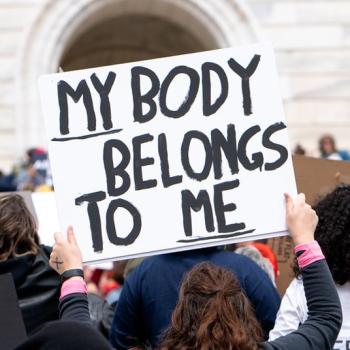The journey to loving and accepting those around us who are gay requires that we believe the best about others and understand the Bible as Jesus did.
I have to think that someone who chooses to come out as gay must be something of an optimist. They must be trusting that the awkwardness of the announcement will wear off and life will somehow be better after that. Even if they expect to be rejected, the relief and freedom to be fully themselves at last must be worth the sacrifice.
Having been for most of my life a conservative, I assumed that “liberal” theology (especially on the LGBT issue) was devised by somewhat degenerate theologians. I figured they had some shady motive for watering down sound doctrine until it was unrecognizable (and unsound).
But I wondered, why would you want to excuse behavior that you know is sinful? – as I assumed was the consensus, due to the many “anti-gay” verses in the Bible. No one in their right mind could be ok with homosexuality. Or so I thought.
But in that moment when I found out someone I loved was gay, many of my conservative assumptions crashed and burned. I still struggle to put into words some of the deep changes I experienced. (Here are my first and second posts on this topic.)
Affirming
For starters, I realized that theology that embraces homosexual people exactly as heterosexual people is not “watered down.” It is not compromised, nor does it excuse sin. No – LGBT-affirming theology says, “you are exactly the same person, loved by God and by me, as you were before I knew you were gay.”
If we welcome someone into our church or home without making assumptions about their sexual orientation, and then find out they’re gay…they didn’t suddenly change – we did! We just learned something we didn’t know before.
And if that knowledge causes us to usher them out the door of our church or home, something is wrong with us, not them. Because God calls us to love all people.

Wonderfully made
I also realized in that moment that a gay individual is just as multifaceted as anyone else. Being gay isn’t a “bedroom only” thing. In the same way that being straight informs my whole life in subtle ways, so does being gay for them.
I’d known this dear young man for years. I knew he was funny and polite, loved to sing, enjoyed nature – all those things that a mom knows about her child’s best friend. So I knew he was more than his sexuality. And that taught me that the same is true of all gay people.
I’m telling you this, not because I’m so enlightened or “hip,” but because it’s so easy, we should all know it. (That’s what this blog is all about – my journey from conservative to progressive Christianity. See my archive here, subscribe to my newsletter here.)
Flawed interpretation
Here’s something else that isn’t rocket science, but I never realized before that day.
The Bible is the source of spiritual wisdom for Christians, but it does not give the complete picture of how to be in right relationship with God, our fellow beings, and the earth. The books of the Bible were written by people in specific times, places, and circumstances – to extrapolate and apply them to 21st century living is no small task.
It was no small task in previous centuries either. We all try to forget, but we know that Christians led the way in condoning slavery (read this and this, for example), Christians gave up their enslaved persons grudgingly, and Christians tried to stop the civil rights movement – by quoting Scripture.
Plenty of other atrocities have been carried out with the blessing of Christians and Scriptural “endorsement.” I know you can think of at least a few.
Of course, the Bible isn’t the problem. The interpretations are. Brian McLaren said in A New Kind of Christian,
Our interpretations reveal less about God or the Bible than they do about ourselves. They reveal what we want to defend, what we want to attack, what we want to ignore, what we’re unwilling to question.
We want it to be God’s encyclopedia, God’s rule book, God’s answer book, God’s scientific text, God’s easy-steps instruction book, God’s little book of morals for all occasions.
The only people in Jesus’ day who would have had anything close to these expectations of the Bible would have been the scribes and Pharisees.

When white Christians wanted to keep people enslaved, we found a way to interpret Scripture that would allow it. When we wanted segregation, lynching, and Donald Trump, surprise! – the Bible told us we could have them.
The Word and the Word Made Flesh
And that is why we need, in addition to the Word, another arbiter – the Word made flesh (i.e. Jesus). Skim over his life and words in the Gospels, and you will notice that he did not use Scripture as “God’s rule book” – he repeatedly turned its words upside-down.
While Jesus never spoke directly about homosexuality, he did give us a good idea of what God desires overall:
Here’s Jesus’ answer to the question, “what must I do to inherit eternal life?”
‘Love the Lord your God with all your heart and with all your soul and with all your mind.’ This is the first and greatest commandment. And the second is like it: ‘Love your neighbor as yourself.’ All the Law and the Prophets hang on these two commandments (Matthew 22:37-40).
And here’s how Jesus describes the lives of people who will be “blessed by my Father” and receive the Kingdom when he returns in glory:
For I was hungry and you gave me something to eat, I was thirsty and you gave me something to drink, I was a stranger and you invited me in, I needed clothes and you clothed me, I was sick and you looked after me, I was in prison and you came to visit me…Truly I tell you, whatever you did for one of the least of these brothers and sisters of mine, you did for me (Matthew 25:35-40).
Notice the complete absence of any mention of rule-keeping.
Am I suggesting that Christians can do whatever we want? That God doesn’t care about our actions? Of course not. I’m suggesting that God prioritizes love and service because they are the real measure of our hearts. The example of Jesus, and prayerful common sense (Martin Luther relied on Scripture and sound reason) teach us how to live responsibly and lovingly.
This is not just a New Testament thing: in Hosea 6:6, God said “For I desire mercy, not sacrifice, and acknowledgment of God rather than burnt offerings” (for more Old Testament examples, see Jeremiah 6:20, Isaiah 1:11, and Amos 5:21-23).
The Bible speaks to us about our gay neighbors: God’s command is to love them (what that means exactly will be unique to each of us and each of them) and look after them.
It also speaks to our gay neighbors about us: they should expect our love and support.
But what about the “gay verses,” aka “clobber texts” in the Bible?
I’m not a Hebrew or Greek scholar, so I won’t try to present my own arguments for or against any interpretation. But I’d like to mention a couple of important points, before referring you to some articles that I think are useful.
- The Bible wasn’t written in English, so what we read may not always be precisely what the original text said. We can consult with experts to learn more about the meanings of words, thanks to the magic of the internet.
- Having said that, you can find scholars who will support your point of view, if that’s all you want to do (confirmation bias). Or you can challenge yourself by reading opposing views. If you do, you will actually learn and grow.
- The words “homosexuality” and “gay” did not exist during Bible times, and – this is key – there was no awareness of the concept of sexual orientation. Keep that in mind as you read. If Bible writers took it as a given that everyone is straight, then two men together would be abnormal, but if those two men are gay, it is normal for them.
- LGBT people today are not asking Christians to become gay, only to recognize them as equals and respect them. Most are in or searching for monogamous, loving relationships.
- As you study, pray that God would reveal his heart to you, not that he would show you how to “hate the sin but love the sinner.”
I recommend this website for some well-thought out expositions of the “gay clobber verses” in the Bible (the link is to just one of several excellent pages on the site). I also found this, this, this, and this helpful. But you should search out and read many commentaries till you find what truly rings true for you – in the context of love and support for our gay neighbors. Never lose sight of that context!
FEATURED IMAGE: “Miniature Food – Pastel Rainbow Cake” by PetitPlat – Stephanie Kilgast is licensed under CC BY-NC-ND 2.0













